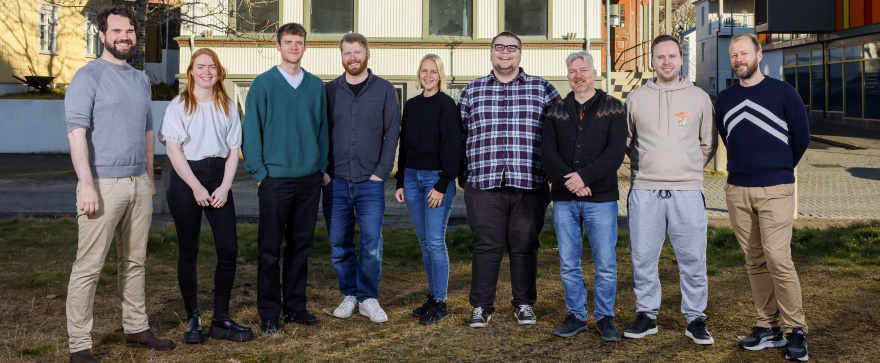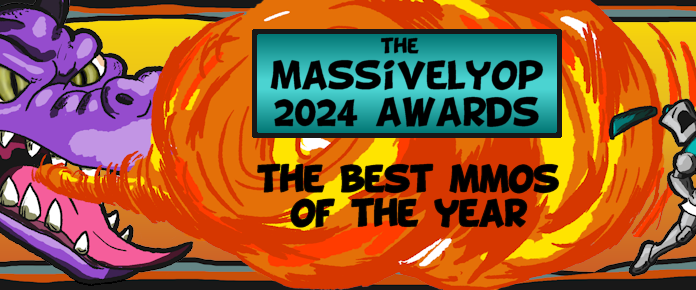
Last November, we reported on a new Icelandic game studio and the hints of its upcoming MMORPG project by ex-CCP developers. Arctic Theory, as it’s called, is working on a title called Annex, a persistent one-shard sandbox MMO intended to “lead the way in creating new metaverses.”
Following this initial announcement of the project and the $2 million seed investment it received to get going, we reached out to Arctic Theory to find out more about the studio and an MMO that is being shaped in some fashion by EVE Online’s design.
Massively OP: Can you introduce your studio and team? How did Arctic Theory form?
Our motivation for founding the company was, first and foremost, a passion for making MMO games, and a desire to build something new and innovative in the MMO space. The
founders have worked on numerous projects in the game industry for decades.
As some of the key people behind EVE Online, our DNA is laced with the need to build living, ever-evolving virtual worlds that immerse players for years. So, that’s what we’re
doing.
What funding does your studio have (internal, venture capital, crowdfunding, etc.)?
Initially, the original founders invested their own money into the studio. This allowed us to
quickly establish space to set the foundation for Arctic Theory and explore creative opportunities at a more comfortable pace. Self-funding additionally allowed us to prototype
while setting up infrastructure in the early days of the company.
In March of 2022, we also closed a pre-seed round with Icelandic VC Brunnur Ventures.
Though we can’t go into detail yet, we’re also pursuing additional funding avenues as we
expand our team.
What is behind the meaning of the two key names you picked out — “Arctic Theory” and “Annex?”
In all honesty, we thought Arctic Theory just sounded cool (and still does).
Annex is still a working title that came from the core idea that players are reclaiming their
place in the world we, and they, are building. Although we haven’t released much in the way of lore and backstory for the game, I can share that the planet has reached a state where the natural elements have taken over. The players enter the game when all that is left are the remnants of its former inhabitants. Their mission is to join together and reclaim their place in this environment. It’s up to the players how they accomplish this.
How many team members do you have? How many have MMO or live service games development experience?
Our core team is currently small, but our headquarters can accommodate up to twenty-five
additional colleagues. As we’re hiring, those roles will be filled in the coming months. We
also have a network of freelancers and remote workers filling our ranks.
Our leadership team has almost half a century of combined experience working on live service games to some extent. One of the pillars we built our company on is that we want to be able to operate our game with a small team. We feel one of the key reasons why there hasn’t been much innovation in the MMO space for some time is that this is a technically complex genre.
What can you tell us of Annex at this juncture? Are you looking at a time frame for a full reveal? How far into development is the project?
It’s set in a post-post-apocalyptic world where a cataclysm wiped out most of the
infrastructure in the world. The players enter at a time when most of this has been sorted
and some semblance of normalcy exists.
The players don’t have to worry about shelter or food, or many things you’d see in a survival-leaning MMO. Their goal is to explore the sandbox world, rebuilding and making their unique mark on the world. I like to think of it as a kind of romantic gold-rush period where there are all sorts of opportunities for those wishing to venture into the unknown wilderness and create the infrastructure needed to harness the resources and valuables that can be found there.
The gameplay is a mix between traditional third person games where the player travels and
interacts with other players, and a worldbuilder where players establish and manage
outposts in the wilderness. The purpose of these outposts are designed for automation and
crafting which means they act as factories to convert raw materials into more useful things
(infrastructure building blocks, tools, vehicles etc.).
These player-operated outposts can then be connected to establish settlements through
which players can start to truly make their mark on the world. Through the settlements
players can erect permanent, grand monuments across the game world. Think the Great
Pyramids of Giza, or the Taj Mahal, for example. Some of these creations will impact the
world in meaningful, permanent ways.
With cooperation, they can also build functional means to access new biomes, like bridges across vast canyons, tunnels, cable cars, etc.
The game has been in active development and testing for the past two years and we’re
pretty happy with where it’s at right now. The goal is to do a proper soft launch of the game in the next few months, including inviting players and streamers to test out certain builds.
Closer to the event, we’ll make an announcement letting the media know when this will occur and where to view the stream. The intention of this event will be to let those participating create the first monument in this persistent world; something that will be a part of the game’s history going forward that new players will be able to find and explore once the game launches in full.
What do you think is missing or needed in the MMO space these days? How is your team equipped to provide that?
The biggest thing missing in the MMO space these days, in our opinion, is innovation. The
formula that many of the MMO games follow has become stale. Studios who dare dip their toes into the MMO genre often try to mitigate risk by simply sticking to the stuff that has worked in the past, which has been done countless times before. This breeds uniformity in a gaming genre that has so much potential to innovate in both story and worldbuilding.
As MMO players ourselves, we know gamers are starved for something new. We are too.
Making MMO games is uniquely challenging on many fronts. Having thousands of players
sharing a persistent game world is technically complex from a game design perspective.
Creating content that’s engaging in a persistent world over a period of months and years is
hugely resource-intensive.
Our studio, tools and team are built specifically to iterate and innovate in the MMO space.
We have developers who have been involved in building virtual worlds for the past thirty-plus years and contributed to some of the most ambitious games ever made. But, we place
massive value on the new generation of game developers who aren’t connected to the
limitations of the past, particularly some of the playing-it-safe habits that have been
developed by the old guard of the MMO space. We use our experience to create an
environment where the next generation of developers can push the genre forward.
You said that you prize “world progression over player progression.” Can you elaborate on that? Does an individual player’s progression not matter for your title?
One of the core design pillars of the game is collaboration, and player progression can limit
that. In traditional MMO games, players are often segmented by their progression. Things
like, if I’m level 120 and you’re level 10, we can’t raid together, enter this region, share
resources, etc. There is also the problem where a player has reached max level, they’ve
“grown out” of a large swath of content that they’ve become too OP to be challenged, and
have fun with their friends.
I don’t want the player progression to gate collaboration, meaning that if people want to play together, their position in a skill tree or experience points won’t prevent that. So by moving much of the progression over to the world itself, if you and your friends want to progress, the reflection of that progress is best seen in your impact on the world.
Having the player’s progression in the world also means that it becomes a literal part of the history of the world. What you do, together makes a mark in a real, measurable way. That is a much stronger motivator to me than reaching a certain level.
We still see value in player progression, but there is definitely a balance between that and
world progression that we are actively developing and balancing.
Are you developing primarily for the PC or multi-platform?
The game is being developed for PC in the beginning, but as it’s being built in Unreal Engine 5, it is multi-platform compatible. For now, our focus is on the platform where we can iterate the fastest, which is obviously the PC.
What are some other studios’ games that inspire you in your current endeavor?
EVE Online has always had a special place in my heart. I played the game for years before
getting my first job in the game industry. As a player I was always so humbled by just being a part of this massive world and the stories there. I rarely fought in the big battles, but I did help with some of the mining operations, and I loved going out scouting. This was the impression the game left on me.
Once I joined CCP as a developer, I always had this feeling that I was building something that mattered to people, and built a legacy in the game.
Other games that are a big inspiration are Factorio and Satisfactory, great building and
manufacturing games that offered a constant opportunity to optimize and create. They make you pick your own brain, and create a deep feeling of satisfaction as you learn and accomplish more within them. And I think lastly the Civilization franchise with its large-scale, constant evolution of the world.
The core of these last three titles are experiences we’d like to see elevated to the MMO
space in unique, genuinely fun ways that engage players for years. We think we’re the studio to accomplish this.















